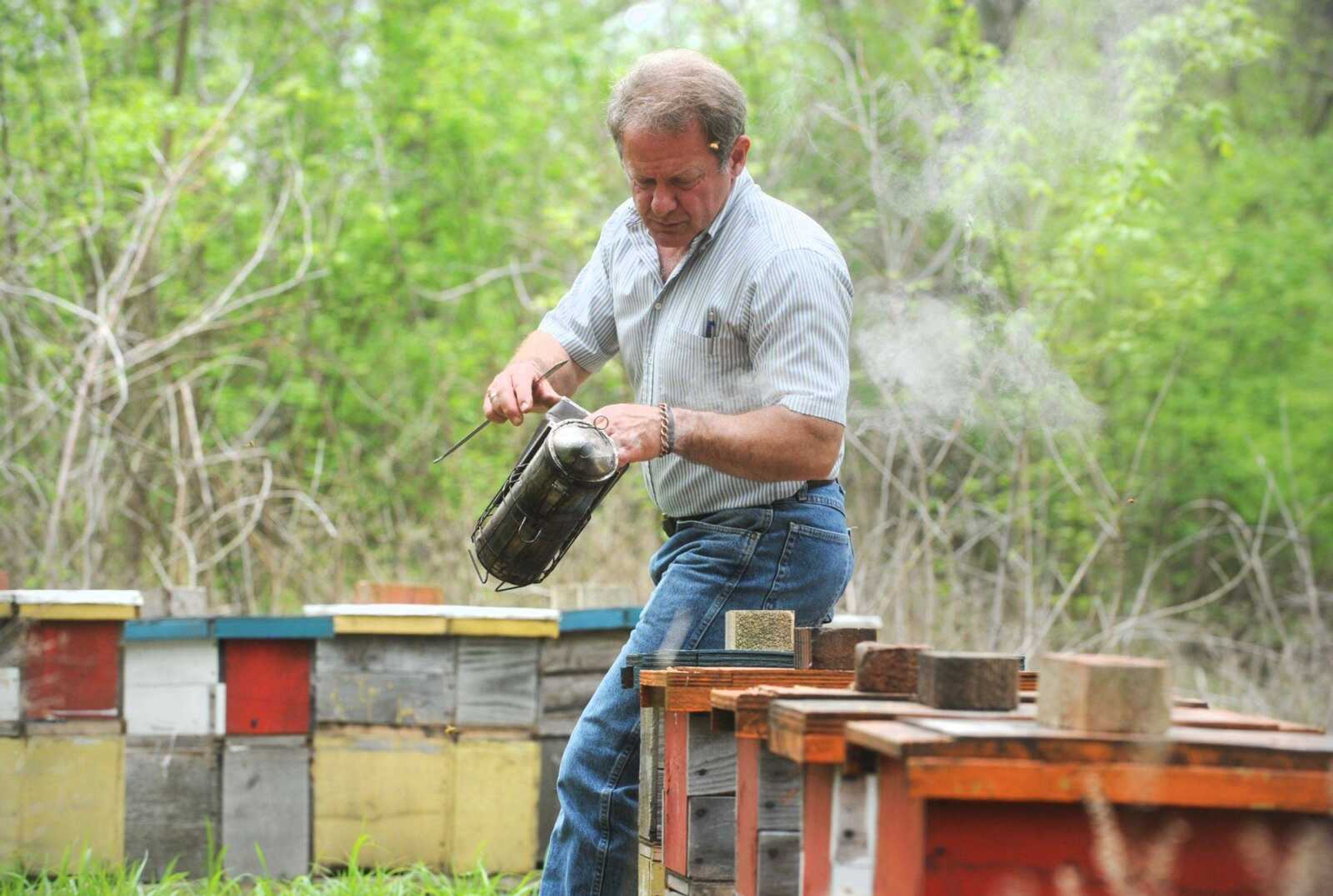Nectar of the gods
"To every thing there is a season ..." Or so says the garden stone at the office where Grant Gillard and his wife, Nancy, package their honey. But the bees that make that honey need no Ecclesiastical reminder. Side yards, flush with blooming yellow rocket, are enough for them. Redbud shrubs nestled among gardens and along sidewalks cracked with dandelion tell the hard-working insects exactly what season it is...
"To every thing there is a season ..."
Or so says the garden stone at the office where Grant Gillard and his wife, Nancy, package their honey. But the bees that make that honey need no Ecclesiastical reminder.
Side yards, flush with blooming yellow rocket, are enough for them. Redbud shrubs nestled among gardens and along sidewalks cracked with dandelion tell the hard-working insects exactly what season it is.
Gillard has been keeping bees since the early 1980s, and said that like any production endeavor, some years are better than others, but the bees themselves are marvels of constancy.
"It's automatic for them," Gillard said. "I think they're just fascinating."
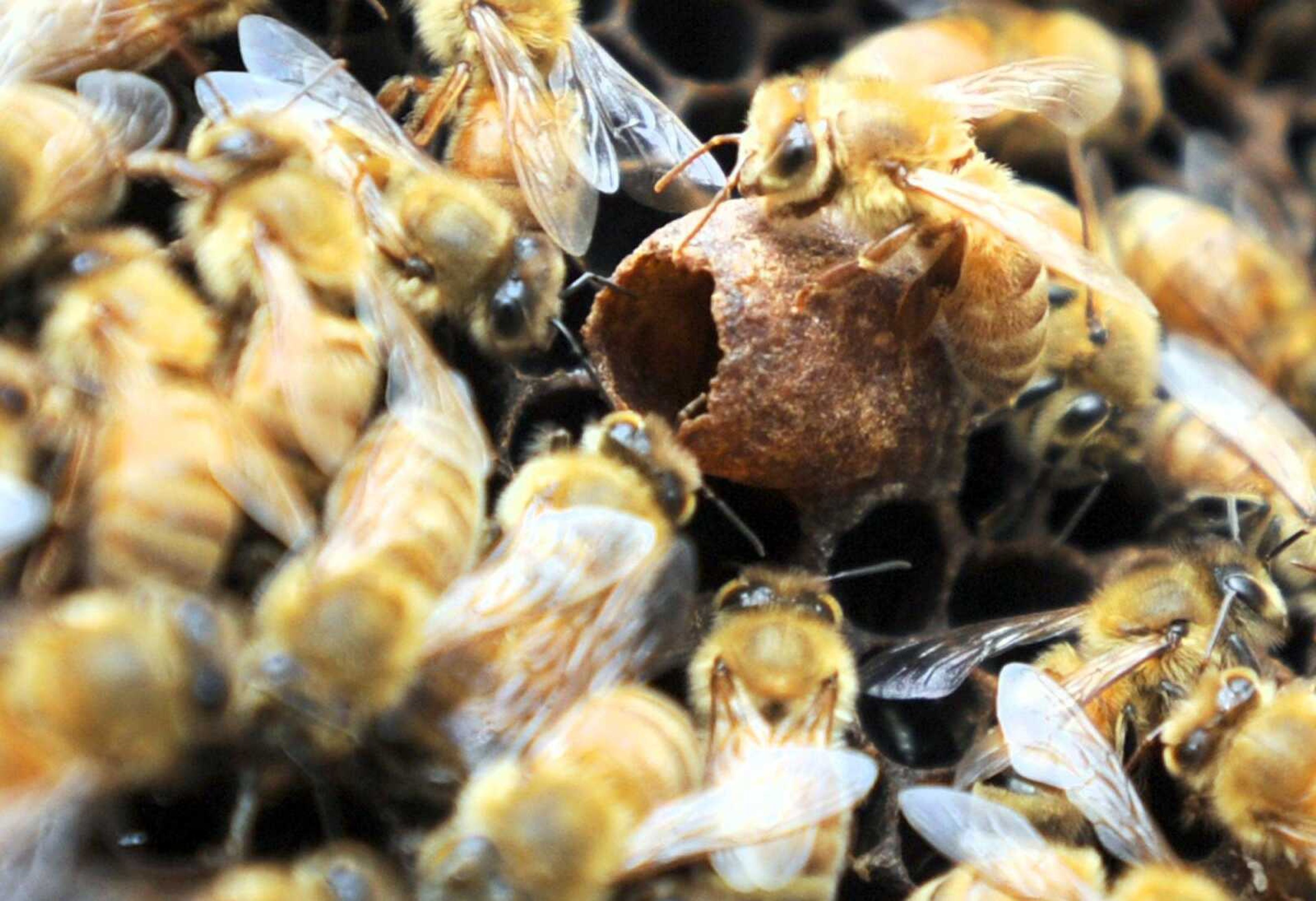
Come early spring, eager queens stir from their winter lull to oversee that one thing bees are made to do: make honey with astonishing industry. They're so good at doing it they face the typical pitfall of highly productive and reliable systems -- they're taken for granted.
But, Gillard explained, to simplify their toil to "bees make honey" would be to ignore the obscure and vibrant world inside each hive.
Gillard keeps roughly 180 hives in dozens of locations across three counties. At a cluster of hives tucked in the woods near his home in Fruitland, Gillard kindles an ember in the little tin smoker he uses to calm the bees before handling them.
"The entire process works on pheromones," he explained. "Everything happens in the dark. It works like magic."
The smoke disrupts the chemical communication between the more excitable bees, and after a few puffs, they're calm enough for Gillard to pry the top off the hive-box. The low hum gets louder as he gently pulls out rack after rack of quivering honeycomb, looking for the queen.
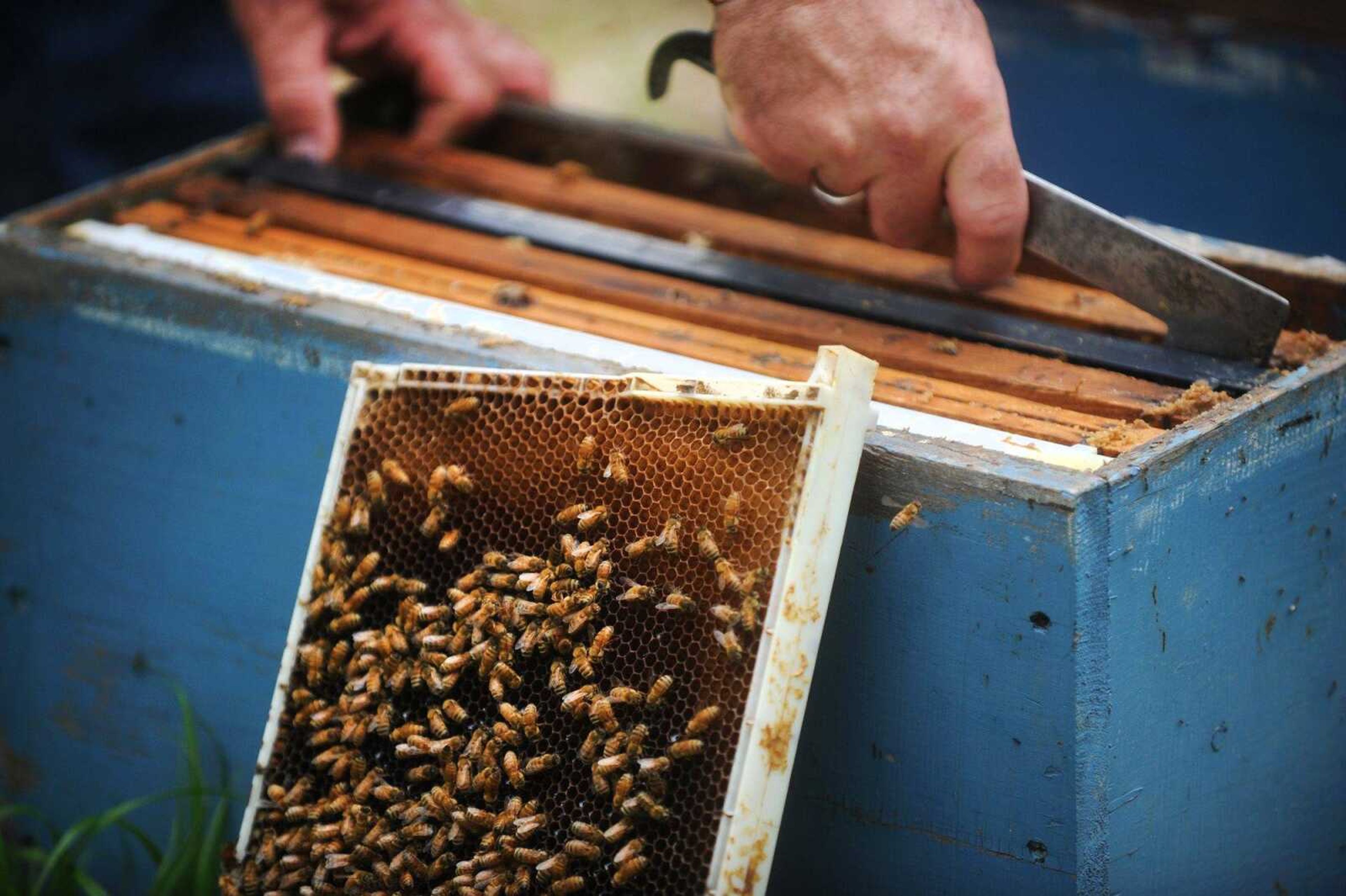
"They're a matriarchal society," he said. "The queen is the social glue that holds the colony together."
It's the queen that tells the worker bees to gather pollen, build more honeycomb or feed the pupae. She's the foreman, the silent arbiter of exquisitely calibrated chaos. It appears as if the worker bees bump and tumble over one another at random, but Gillard points out that each is singularly focused on the task at hand.
"Bees take care of themselves. They're incredibly autonomous," Gillard explained. "Nobody shows up drunk, nobody goes on strike. It's the perfect little society. What would it be like if human beings could take on that mentality?"
He jokes that for a Calvinist minister such as himself, it's an enticing, if impossible, ideal. But simply being alone in the woods and beholding such natural clockwork is good for the spirit.
"It's my sanity keeper, to come out here," he said. "There's a hymn that we sing in church that says, 'This is my Father's world, and in the rustling grass I hear him pass.' It's a divine thing."
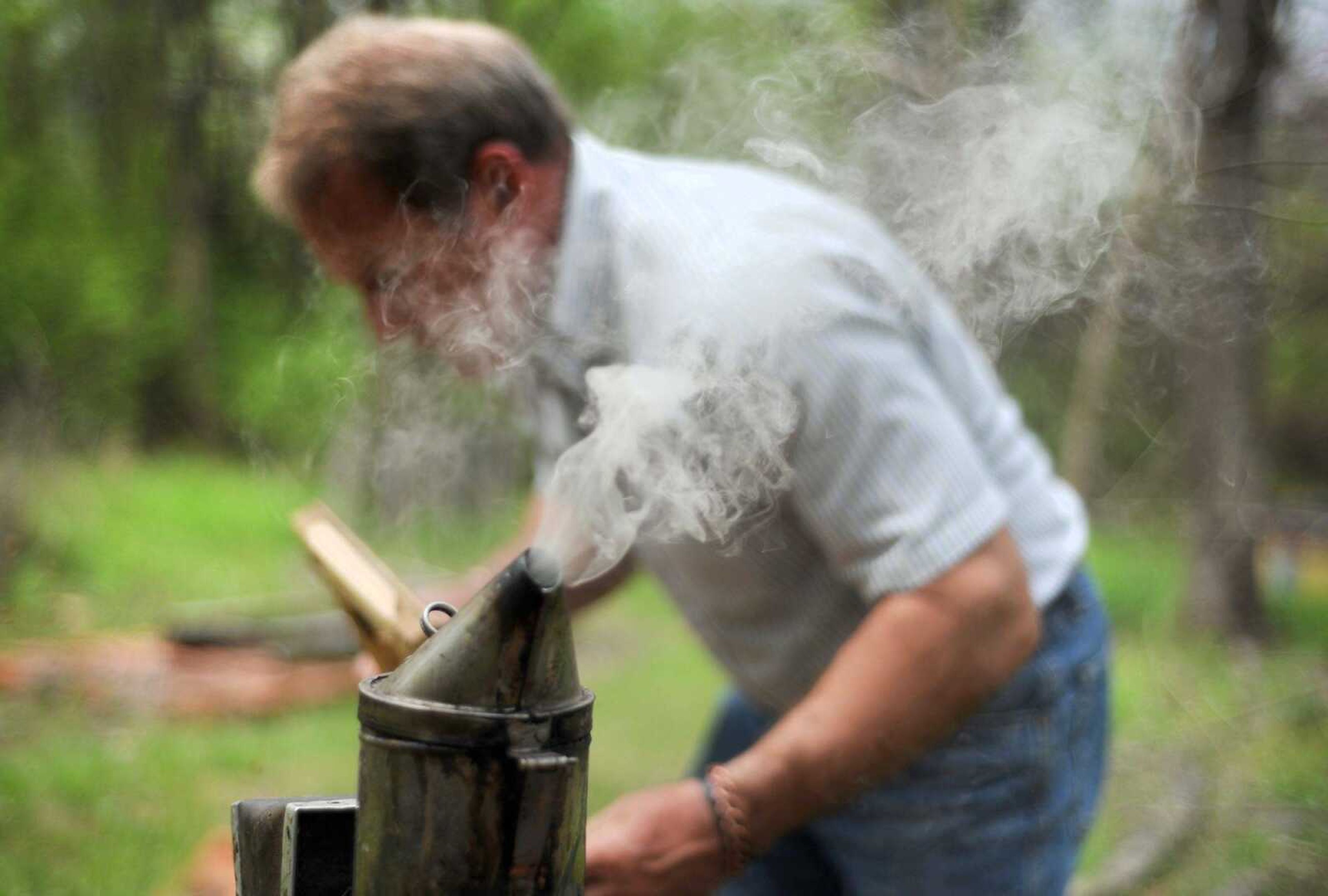
He's so at ease with the bees that for a light checkup like this, Gillard foregoes even a head net.
"Getting stung is obviously part of the job," he said.
It's a lesson he learned early in his beekeeping career, in a class his college adviser warned him not to take.
"He said, 'You don't want to take that. That's for the granola crowd; you know, the nuts and the flakes and such,'" Gillard recalled. "Even 10 years ago, there was no glamour in it. It was sort of like being the crazy cat lady."
But he took the class anyway, figuring it would be an easy A.
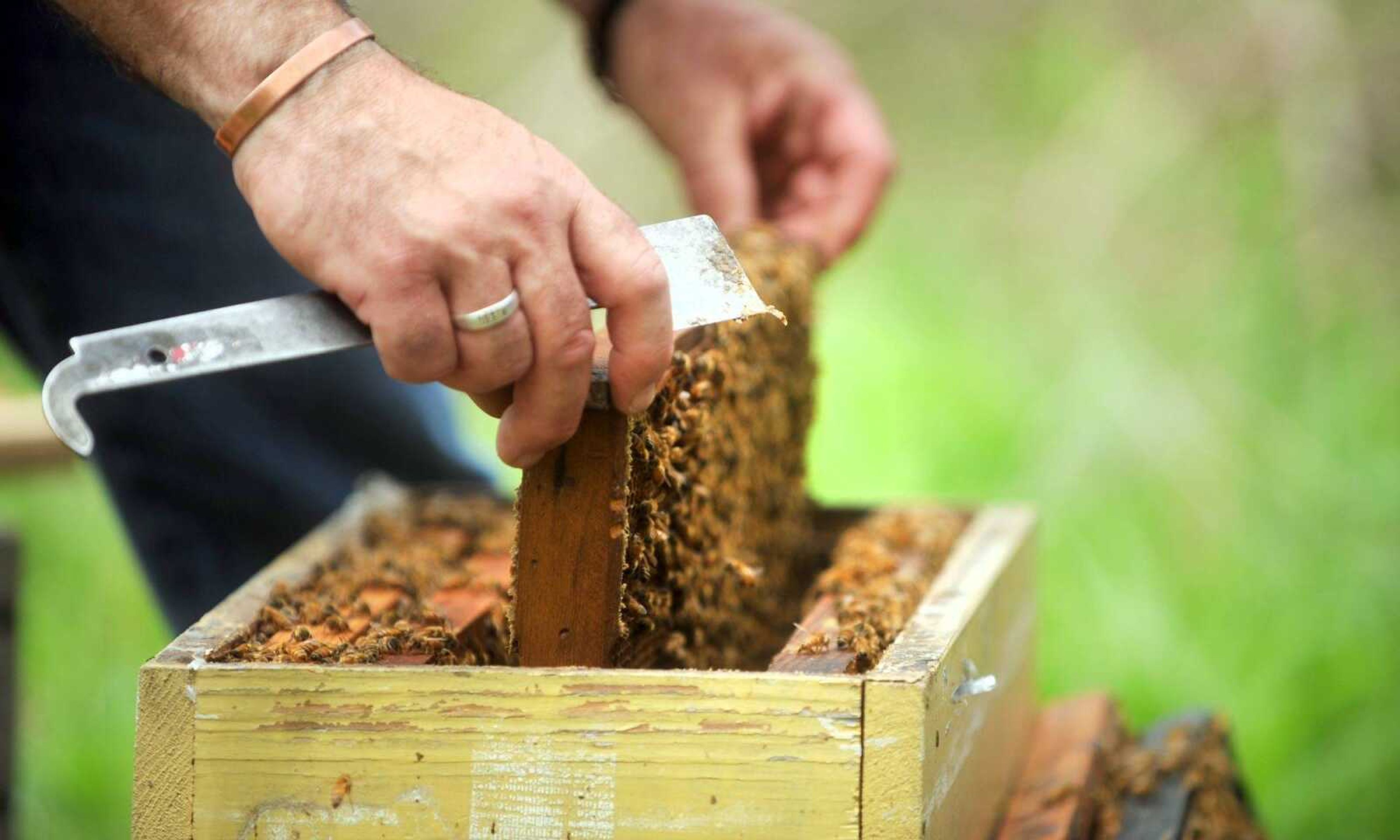
"The professor said that if you get stung, you get an A. That means you're working the bees," Gillard said. "If you didn't get stung, you got an F, since that meant you were hanging back, being the recorder."
As it turns out, beekeeping class was an easy A. But bees were what captured Gillard's interest. In the class, he also learned that bees do most of the work on their own, which, he said, is one of the reasons there has been a renaissance in backyard beekeeping.
"[Commercial] beekeeping is hard work physically. It's hot work. There's heavy lifting that occurs in July," he explained, but to maintain just a couple of hives in one's spare time is no more difficult than having a few chickens.
"We've had an incredible response," he said of the growing trend. "But still, 10,000 backyard beekeepers can't replace one old beekeeper with 10,000 hives."
He said that's part of what's been fueling the rumors that have circulated in recent years about honeybees' dire predicament.
Although the number of honey-producing bee colonies has been on a steady decline since the 1950s, he said the environmental panic isn't as clear-cut as some would make it out to be.
The decline, Gillard explained, is because of a number of convergent factors, not the least of which has been a steadily diminishing interest in beekeeping since the 1940s and 1950s, when beeswax was needed to waterproof Army tarps.
"It's not just the bees that are dying," he said. "It's the beekeepers as well."
It's also important to keep in mind that honeybees such as Gillard's aren't a native species. Carpenter bees, on the other hand, are native to Missouri. And like the honeybee, while not on the verge of extinction, it has seen better seasons.
Fortunately, there are amateur conservationists such as recent Saxony Lutheran High School graduate Kristen Gruenwald of Altenburg, Missouri, who installed carpenter bee-houses as part of a project to earn her Girl Scouts of America Gold Award.
She said the project was as straightforward as finding a blueprint on Pinterest, and the impact is larger than it may seem.
"I hope people realize the importance that bees represent for our environment," she said. "No more bees, no more man. They pollinate our orchards."
Gillard said bees aren't going anywhere overnight, but little acts by ordinary people make a difference for bees and, by extension, human beings. After all, life wouldn't be so sweet without them.
tgraef@semissourian.com
388-3627
Connect with the Southeast Missourian Newsroom:
For corrections to this story or other insights for the editor, click here. To submit a letter to the editor, click here. To learn about the Southeast Missourian’s AI Policy, click here.
